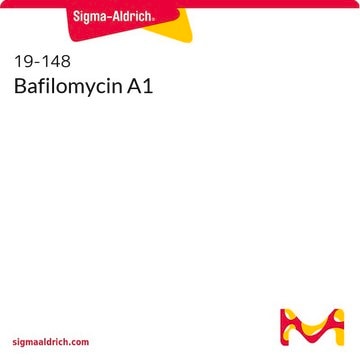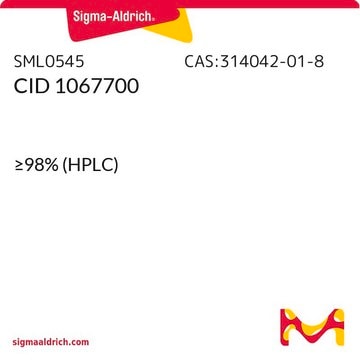SAE0107
3-Methyladenine Ready made solution
≥98% (HPLC), 7.5mg/ml (50mM) in MES buffer, Autophagy inhibitor
Sinónimos:
3-MA, 6-Amino-3-methylpurine, autophagy inhibitor
Iniciar sesiónpara Ver la Fijación de precios por contrato y de la organización
About This Item
UNSPSC Code:
12352202
NACRES:
NA.51
Productos recomendados
assay
≥98% (HPLC)
form
liquid
concentration
7.5 mg/mL
shipped in
ambient
Storage temp.
−20°C
Categorías relacionadas
General description
3-Methyladenine (3-MA) is a methylated derivative of adenine that has been used as an In vivo marker for the methylation of DNA. 3-Methyladenine and 7-methylguanine are the two main N-methylpurines formed in DNA upon exposure to methylating agents. 3-MA is removed from damaged DNA via the DNA base excision repair pathway, which begins with the enzyme N-methylpurine DNA glycosylase. The dependence of 3-MA repair on nucleotide excision repair in mammalian cell lines has been studied.3-MA have been widely used as autophagy inhibitor based on its inhibitory effect on class I and class III PI3K activity, which is known to be essential for induction of autophagy. 3-MA blocks class I PI3K persistently, whereas its suppressive effect on class III PI3K is transient, understanding the dual role of 3-MA in autophagy thus suggests that caution should be exercised in the application of 3-MA in autophagy study.
Furthermore, 3-MA is also capable of making the reduction of lymphocyte number caused by chronic stress rebound, implying that inhibition of autophagy can rescue chronic stress-induced immunosuppression.
Autophagy has been reported to play an important role in the 3, 4-Methylenedioxymethamphetamine MDMA-induced neurotoxicity in the mixed neuronal-glial primary culture and it was found that 3-MA ameliorate MDMA-induced autophagy, SERT loss, HPA axis dysfunction, and depressive behaviors.
Furthermore, 3-MA is also capable of making the reduction of lymphocyte number caused by chronic stress rebound, implying that inhibition of autophagy can rescue chronic stress-induced immunosuppression.
Autophagy has been reported to play an important role in the 3, 4-Methylenedioxymethamphetamine MDMA-induced neurotoxicity in the mixed neuronal-glial primary culture and it was found that 3-MA ameliorate MDMA-induced autophagy, SERT loss, HPA axis dysfunction, and depressive behaviors.
Application
3-Methyladenine (3-MA) is used to inhibit and study the mechanism of autophagy (lysosomal self-degradation) and apoptosis under various conditions. 3-MA inhibits autophagy by blocking autophagosome formation via the inhibition of type III Phosphatidylinositol 3-kinases (PI-3K). For use as an autophagy inhibitor, 3-MA is typically used at a concentration of 5mM.
Preparation Note
3-Methyladenine ready made solution is provided at 50mM (7.5mg/mL) concentration in MES buffer.
It is recommended to store 3-methyladenine readymade solution at -20C.
In case percipitates are formed upon thaw, use sonication and heat to get the product back into solution.
It is recommended to avoid freeze thaw cycles.
When stored properly 3-Methyladenine readymade solution should be stable for 2 years.
It is recommended to store 3-methyladenine readymade solution at -20C.
In case percipitates are formed upon thaw, use sonication and heat to get the product back into solution.
It is recommended to avoid freeze thaw cycles.
When stored properly 3-Methyladenine readymade solution should be stable for 2 years.
Storage Class
12 - Non Combustible Liquids
wgk_germany
WGK 2
flash_point_f
Not applicable
flash_point_c
Not applicable
Certificados de análisis (COA)
Busque Certificados de análisis (COA) introduciendo el número de lote del producto. Los números de lote se encuentran en la etiqueta del producto después de las palabras «Lot» o «Batch»
¿Ya tiene este producto?
Encuentre la documentación para los productos que ha comprado recientemente en la Biblioteca de documentos.
Los clientes también vieron
Priyanka Basak et al.
Frontiers in pharmacology, 13, 903438-903438 (2022-07-26)
Antibiotic treatment plays an essential role in preventing Shigella infection. However, incidences of global rise in antibiotic resistance create a major challenge to treat bacterial infection. In this context, there is an urgent need for newer approaches to reduce S.
Venkatesh P Thirumalaikumar et al.
Autophagy, 17(9), 2184-2199 (2020-09-25)
In nature, plants are constantly exposed to many transient, but recurring, stresses. Thus, to complete their life cycles, plants require a dynamic balance between capacities to recover following cessation of stress and maintenance of stress memory. Recently, we uncovered a
Kevin L McKnight et al.
Proceedings of the National Academy of Sciences of the United States of America, 117(44), 27598-27607 (2020-10-17)
Human rhinoviruses (RVs) are positive-strand RNA viruses that cause respiratory tract disease in children and adults. Here we show that the innate immune signaling protein STING is required for efficient replication of members of two distinct RV species, RV-A and
Nuestro equipo de científicos tiene experiencia en todas las áreas de investigación: Ciencias de la vida, Ciencia de los materiales, Síntesis química, Cromatografía, Analítica y muchas otras.
Póngase en contacto con el Servicio técnico













